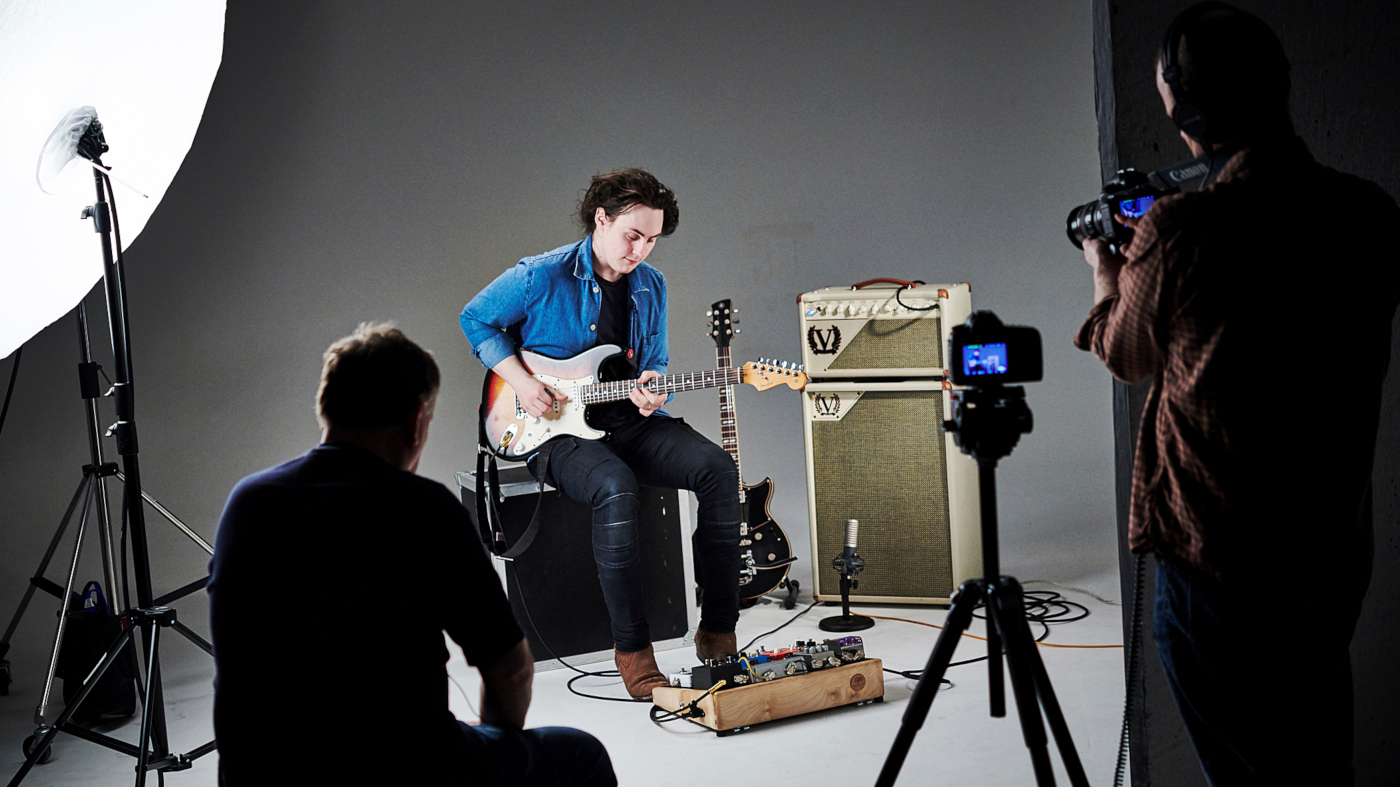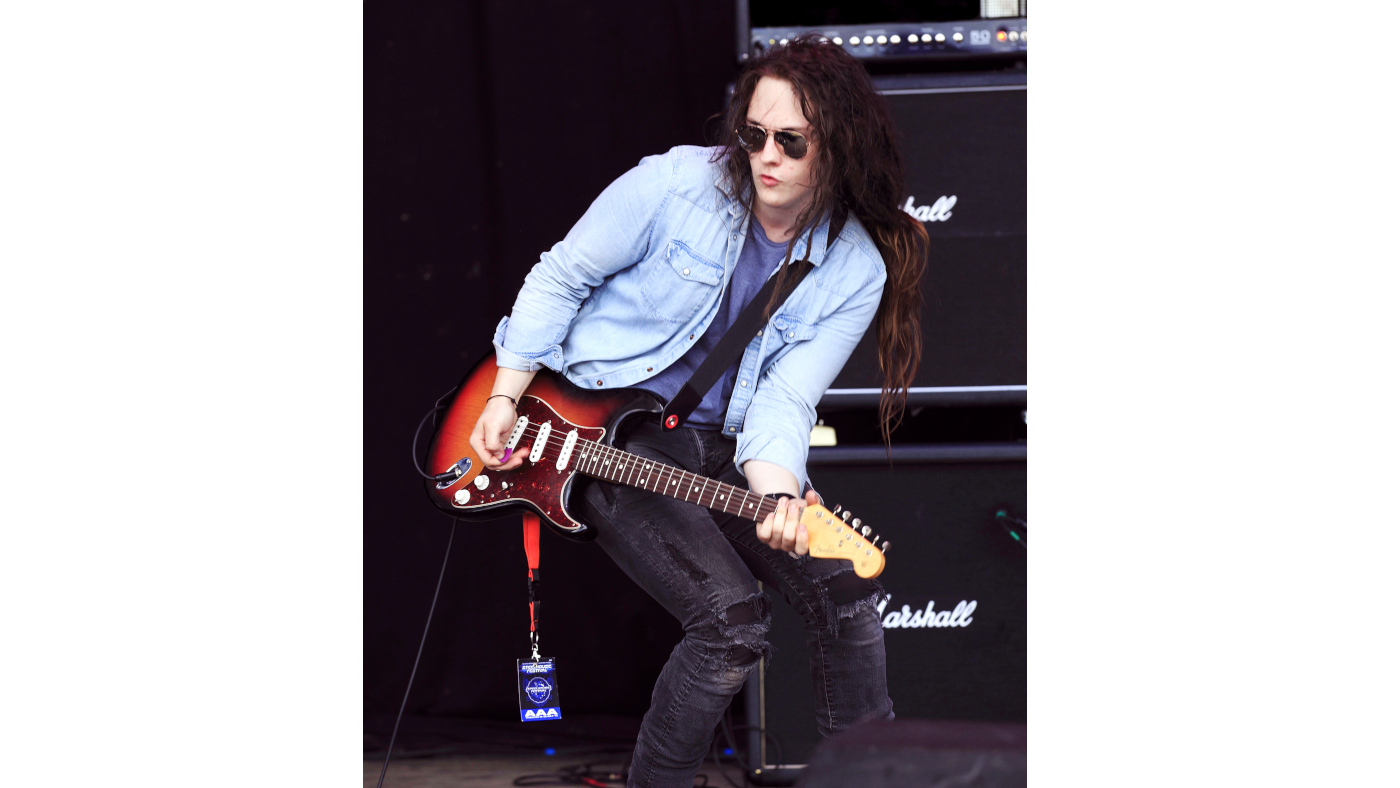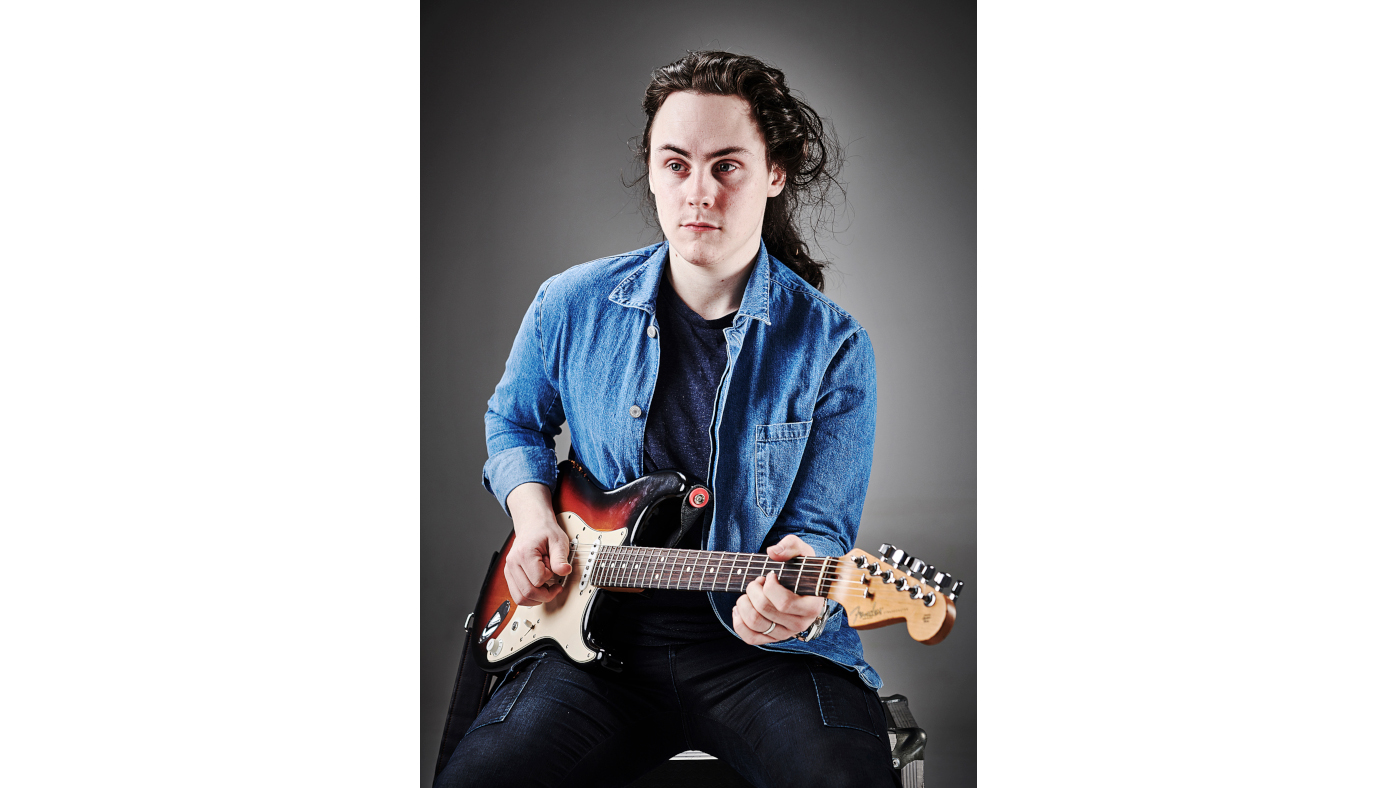Chris Buck: “I thought, ‘Let’s immerse myself in some different sounds and see what it brings out of me.’ That was the making of me”
We talk to the fast-rising, poll-winning UK player

When a player of the calibre of Guns N’ Roses’ resident mad-hatter Slash says of someone, “This guy’s a f**king awesome guitar player...” and that same someone goes on to win Best New Guitarist in our sister magazine Total Guitar’s online poll, it’s time to sit up and take notice...
The above was the case with Chris Buck, whose soulful bluesy Strat tones ripple tonefully throughout his band Buck & Evans’ debut album, Write A Better Day. The album is causing a stir, with singles receiving A-list play on radio and live dates creating a buzz at venues across Europe. He’s even got his own set of signature Strat pups from Radioshop Pickups and we hear that they’re the company’s top-seller. He’s still in his 20s, and Chris’s reason for starting to play guitar is laced with juvenile cunning.
“I guess I’d have been about 12 or 13 when I started and, hand on heart, it was an excuse to get out of maths lessons in school, because I realised the guitar slots coincided with my maths lessons,” he tells us. “A mate of mine started playing and, suddenly, come 2pm on a Thursday afternoon, he was buggering off for guitar lessons, so I thought, ‘I’ll have a bit of that action.’”
And thus, a career in music had, albeit unwittingly, begun. Retrospectively, his choice to pursue guitar was a natural progression, as Chris remembers. “I’d always been surrounded by guitar music I guess, looking back, whether it was The Beatles or Stones or Dylan...”
After the maths-dodging guitar lessons had begun to bite, a few guitarists first captured Chris’s imagination.
“Clapton was the first guy I remember being conscious of as a guitar player. [John Mayall’s] Blues Breakers was the first album where I became aware of the guitar as a virtuoso instrument. Then, going through high school and listening to a lot of different bands, I guess Slash was the first guy that I latched onto as someone I discovered myself.
"Whether it was trying to look like Slash, playing a low-slung Les Paul, or wanting a stack of Marshalls to play in the bedroom to annoy the neighbours, I was just immersing myself in this guitar god that I’d sort of discovered myself. So Clapton and Slash are the two biggest individual influences, I guess.”
Want all the hottest music and gear news, reviews, deals, features and more, direct to your inbox? Sign up here.

Hendrix chords
Your chord style evokes Hendrix - when did you become aware of Jimi?
“Sacrilegiously late. Jimi Hendrix was one of those guys that inevitably you get turned onto the moment people know you’re into guitar. I feel a little ashamed to admit that I didn’t get it for the longest time.
"I think I saw the theatrical side of his live performances, but I just found it a little bit messy and a little bit out of tune. I filed him in this sort of mental cabinet: ‘I’ll come back to this, because that many people can’t be wrong.’
I played with Slash on a couple of occasions - totally surreal
“And I remember coming back to it. I think it was hearing Bold As Love for the first time, and being amazed at just how strong the songwriting was, getting into it in a big way. Coming to appreciate the idiosyncrasies and everything that had turned me off it when I was younger and didn’t have the maturity to understand or appreciate what I was hearing.”
When you did decide that you wanted to make music your career?
“It was never a conscious decision. It just felt like a natural progression from making music at school to suddenly leaving school and going to do a music degree - which I dropped out of in the first year, because the band I was in started to get a lot of gigs and we were going to the US and all this kind of stuff.
"I entered a competition when I was a kid - Caerphilly Young Musician Of The Year, or something like that - and I won it. I didn’t go into it expecting anything at all. The school made me enter it because it was a sort of, ‘If you’re having guitar lessons, you have to enter these competitions on behalf of the school.’ I won and it really took me by surprise, because prior to that I had no aspirations - all I knew was that I enjoyed it and it felt like it came relatively naturally.”
It must have been quite a thrill to go to America while still fairly young?
“Retrospectively, that was one of the things that gave me the confidence to try and have a crack at this being my living. Being in a situation where you are suddenly whisked off to this place that you’ve only ever dreamed about playing, where all this great music has come from. I played with Slash on a couple of occasions - totally surreal. He’s been incredibly generous with his time and with everything he’s said about me.”

Forward Slash
Did Slash influence your initial choice of Les Pauls before you switched to Strats?
“I think as a consequence of being such a Slash fan, it was the low-slung Les Paul and Marshall half-stack, which - naturally, when you’re 14 - you think you need. I suddenly realised that trying to drag that setup into the Dog & Down on a Friday night, it’s not necessarily what is required. So for the longest time it was the Marshall half-stack with the Les Paul, and anything else other than a wah pedal in between was witchcraft.
I kind of wanted to sound a little bit more like me at some point
“I think the Strat thing came about because I suddenly became very conscious of the fact that I sounded exactly like Slash. There’s only so long that people telling you that is perceived as a compliment and I kind of wanted to sound a little bit more like me at some point.
"I had a Strat knocking round that me and my old man had cobbled together from various bits that we bought on eBay. I remember plugging it in for the first time and being incredibly disappointed because it didn’t sound like a Les Paul.”
What made you persevere with the Strat?
“It reached the point where I thought, ‘Well, let’s immerse myself in some different sounds and see what it brings out of me.’ That, for me, at least, was the making of me in terms of finding my own voice and listening to Strat players more attentively and trying to pick out bits and nuances of their tone that I wanted to try and replicate. That was undoubtedly the moment that turned me onto pedals, because Strats sound beautiful clean. Les Pauls, I’ve never been entirely happy with the way that I can get them to sound clean, you know? In hindsight, I was just doing everything wrong. I had this pivotal moment in terms of, ‘Well, let’s try some pedals, and maybe set the amp slightly cleaner and use an overdrive pedal,’ and before you know it you’ve gone from a Boss Blues Driver to 15 pedals sat in front of you while you’re still chasing about one pedal that will make you sound like Stevie Ray.”
The Strat you’re using today isn’t a wildly expensive Custom Shop model, either, is it?
“I’ve always been slightly suspicious of more expensive guitars. I’m lucky enough to have a couple that I use that are great for studio stuff or just playing round the house. But in terms of gigging them and touring them, I’m always a little bit reticent to take the nice stuff out of the house, just because you’re worried about what’s going to happen to it.
"We’ve all heard horror stories. Luckily, I’ve not had any happen to me yet where a guitar goes into a plane in one bit and comes out in two. It’s just wanting to minimise the chances of things going wrong. We do a fair amount of flying round Europe and there’s that slight trepidation, watching that guitar disappear through the conveyer belt... If I can emotionally detach myself from that as much as possible and financially detach myself from it as much as possible, it takes the worry out of the flight.”

Hit the Highway
The Highway One Strat - which cost you only £400 - was bought as a test bed for your signature Radioshop pickup set...
“Yes, that Strat was bought entirely with no aspirations of keeping it on past using it as a donor guitar for the design of the pickups. Probably on some subconscious level, having gone through that prototyping stage of trying different styles, different winders, different wires, that was the guitar that those pickups were developed to use with. I bonded with it, I guess, without necessarily realising it. That guitar plays beautifully and, again, being £400 it’s just slightly less irksome if anything does actually happen to it.”
You’re a self-confessed pedal enthusiast - what’s the story there?
The key to pedals is not getting so totally bogged down in them that you become reliant on them
“Oh, man. That’s a hell of a journey unto itself. I think the key to pedals is not getting so totally bogged down in them that you become reliant on them. I would be just as happy if you plugged me straight into an amp with a bit of dirt and told me to do a gig with that. But, for me, it’s the different shades, different colours, different textures that draw different facets out of my playing.
"For some people, it’s delay pedals; for some people, it’s modulation, different phasers, different Uni-Vibes or whatever. But, for me, it’s always been overdrive pedals. I’ve probably spent a bloody astronomical amount on overdrive pedals over the years that I’ll never quite recoup, because I’m useless at selling anything that I own. The pedalboard is undoubtedly the most expensive part of my rig. Frightening to think about, really.”
Tell us about your latest pedal discovery...
“A guy called Joe from a company called Hello Sailor [Effects] got in touch with me a couple of months ago saying, ‘Look, no obligation. Not expecting you to do anything about this. Just want to see what you make of it as much as anything.’ So he sent me this pedal, and it’s a Rangemaster with a Klon buffer in it, I think - it’s just labelled ‘Rangemaster’ - and that pedal sounds fantastic.
“I’m slowly turning onto overdrive pedals that are a little bit more gritty and a little bit more ‘warts and all’. I think the younger you are, the more you want something that’s smooth and kind of takes the edges off things a little bit, and ultimately makes you sound a little bit better than you probably are. But the older I get, the happier I am to play with those slightly nastier, sort of grittier overdrive pedals. As I mentioned, it’s the journey, the ongoing journey of trying to find the things that you feel most at home with.”
Buck & Evans’ latest album, Write A Better Day, is available now

